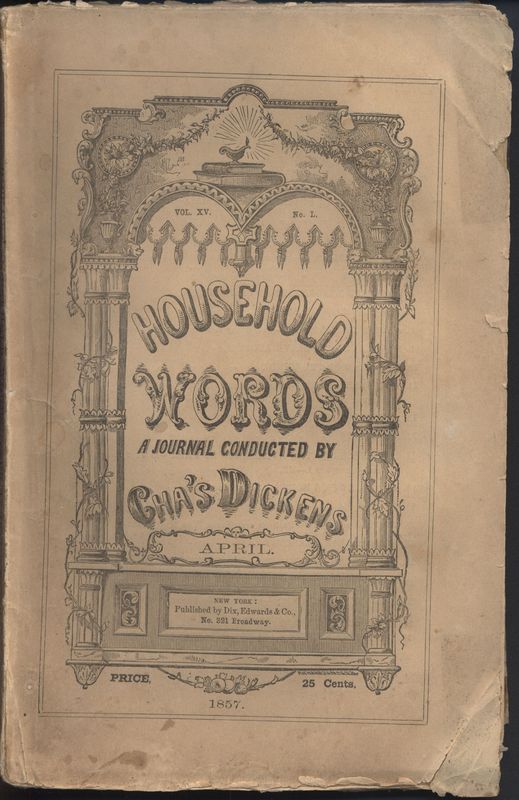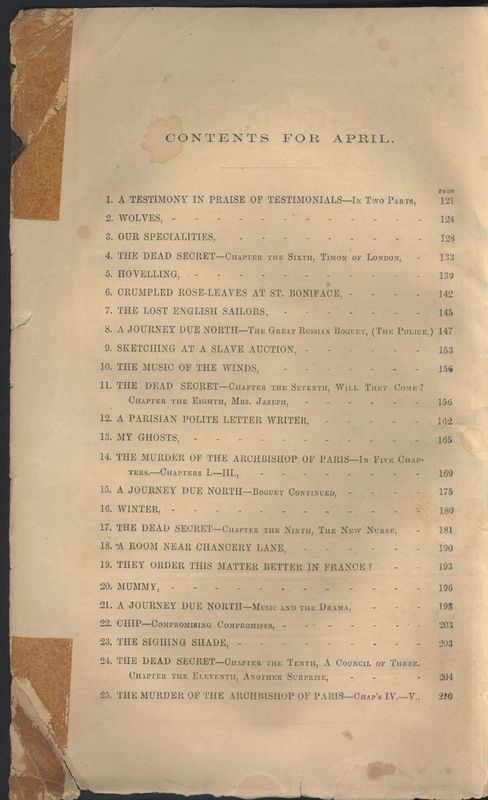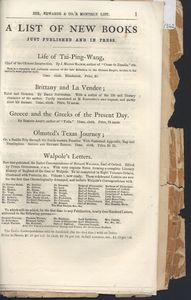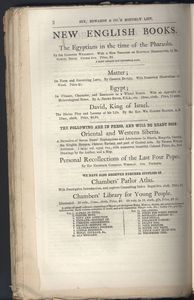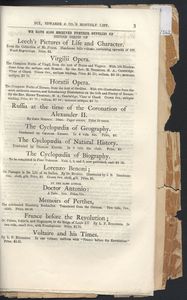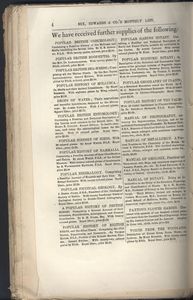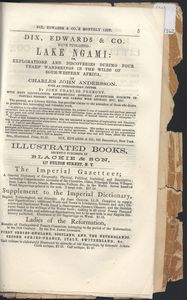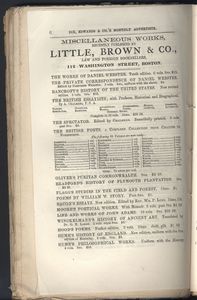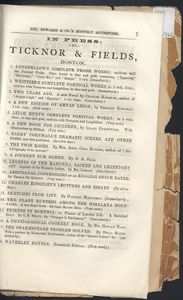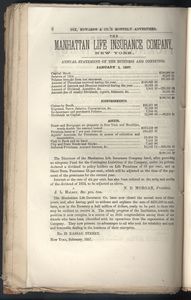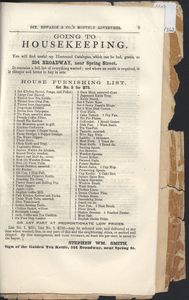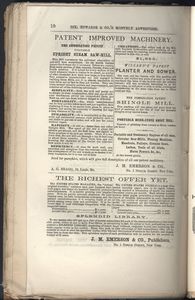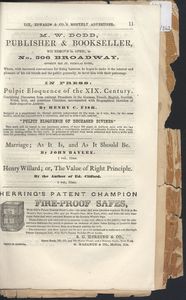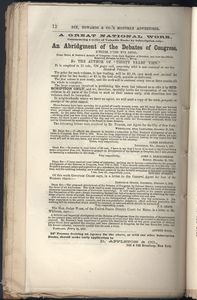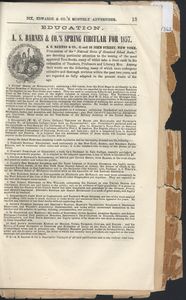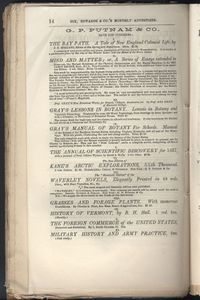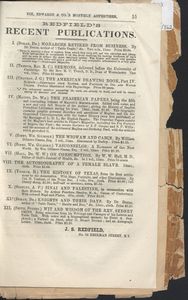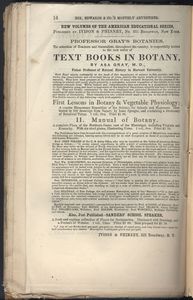Household Words, conducted by Charles Dickens (1850-59)
What is Household Words?
Household Words is a periodical "conducted" by Charles Dickens that ran from 1850-1859 and takes its name from a line in act IV, scene II of Henry V: "Familiar in their mouths as household words." The periodical came out weekly, in wrapped, monthly issues (this page of the exhibit looks specifically at the American edition of the April 1857 issue) and in eighteen approximately biannual volumes, published over the course of Household Words's run.[1] Dickens’s name, as "Cha's Dickens," appears as the "conductor" of the journal, a title he gave himself in place of "editor," but each issue actually contains material from a number of contributors, most of whom were never explicitly named in the periodical. While the title page boasts a detailed design, the periodical as a whole was unillustrated and presented text in basic columns (see the first image in the next section for an example). Household Words published both non-fiction and fiction, often serializing the novels written by Dickens and his contemporaries, such as Wilkie Collins, Elizabeth Gaskell, and Robert Stephen Hawker. Household Words established a reputation for publishing impressive Christmas volumes, and Dickens often asked his favourite contributors to write stories for these special issues.
Dickens's publication was hugely popular, leading to its subsequent printing and distribution in America as well as in Britain. Bradbury & Evans were the original publishers, based in London, but the specific issue on which this page focuses is the American version, published in New York by Dix, Edwards & Co. The journalistic content of the periodical is the same in both editions, with the only difference in this volume being the advertisements in the back. The gallery below includes images of all sixteen pages of advertisements. The images are worth exploring, as they advertise American services ranging from life insurance to newly published books and textbooks to fire-proof safes to a complete set of kitchen supplies. The range of adverts points toward the broad range of the periodical’s readership and its widespread popularity. Anne Lohrli, a scholar who has done extensive work on Household Words, notes that at its height, Household Words sold "some forty thousand copies a week and became, as Dickens hoped it would, 'a good property,' yielding 'a good round profit.' Dickens brought the periodical to an end, in 1859, only because of his altercation with his publishers, and then only to establish a second periodical – All the Year Round – on the same plan as the first" (23-24).[2]
Dickens as Conductor
By designating himself "conductor" of Household Words, Dickens implies that his influence extends beyond that of an editor and that, instead, he has authority over the journal's holistic production. Being in a position of control, Dickens was able to create the sort of publication that he had always wanted, "a journal in which he could speak personally to the large circle of readers whom his novels had drawn to him" (Lohrli 3), "a journal that could reach across all social boundaries" (Clemm 6). Household Words was exactly that journal. Its content can be roughly divided into three main categories—"material of social import, informational articles, and material for entertainment" (Lohrli 4)—about all of which Dickens felt passionately. Dickens, while best known for his fiction, was also an outspoken activist for the poor and underprivileged in London, and Household Words proved an effective platform for addressing what he saw as social problems. In addition to his social justice agenda, Dickens also made Household Words a platform for the dissemination of general information on topics of interest to the public and the publication of serialized novels, amusing fiction, and other pieces written for entertainment.
In the inaugural issue of Household Words, Dickens wrote a short "Preliminary Word" to introduce his readers to this new publication. He describes the goals of Household Words as follows:
We aspire to live in the Household affections, and to be numbered among the Household thoughts, of our readers. We hope to be the comrade and friend of many thousands of people, of both sexes, and of all ages and conditions, on whose faces we may never look. We seek to bring into innumerable homes, from the stirring world around us, the knowledge of many social wonders, good and evil, that are not calculated to render any of us less ardently persevering in ourselves, less tolerant of one another, less faithful in the progress of mankind, less thankful for the privilege of living in this summer-dawn of time. (1) [3]
Dickens's hopeful tone and explicit inclusion of "both sexes" and "all ages and conditions" speaks to his desire both to reach as broad an audience as possible and to be understood as a family publication; Dickens meant for Household Words to be read by everyone in the family, and Victorian families would often have read aloud to each other from publications such as this one. While the main focus of Dickens's introduction seems to be sharing "the knowledge of many social wonders, good and evil", it is important to remember that Household Words, as mentioned previously, also published many pieces intended to entertain. One such example is Rev. James White's "A Testimony in Praise of Testimonials."
[1] The University of Victoria's Special Collections is home to a number of these larger, bound volumes.
[2] Dickens published All the Year Round, over which he had more control than Household Words, from 1859 until his death in 1870. John M. L. Drew notes that "Although identical to its predecessor in appearance, All the Year Round was, in fact, rather different - most notably in the much greater emphasis placed on fiction" ("Evolution" 183), but the journal would have appealed to much the same audience as Household Words.
[3] Dickens, when he refers to "this summer-dawn of time", is likely using a seasonal metaphor to acknowledge the upturn in the British economy that would lead to the 1850s being a decade of prosperity for much of Britain.
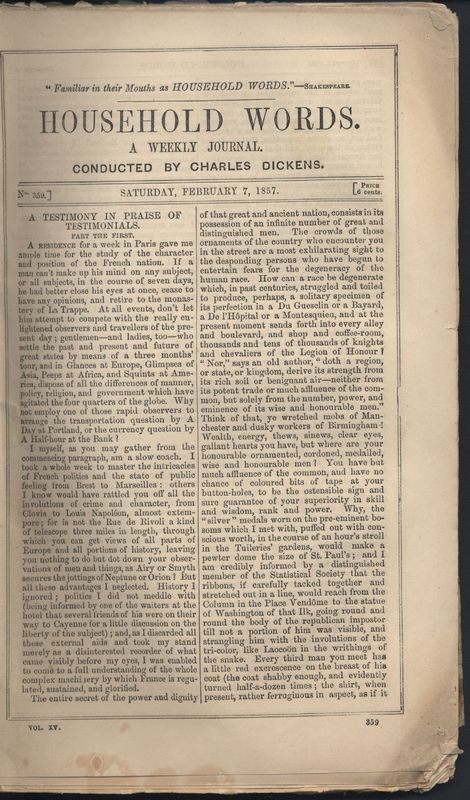
A Testimony in Praise of Testimonials, page 1.
Click the image for the full article, or see a transcription provided by Dickens Journals Online.
Rev. James White's "A Testimony in Praise of Testimonials"
"A Testimony in Praise of Testimonials" was written by Rev. James White, a close friend of Charles Dickens (their families often vacationed together). Dickens invited White to contribute to Household Words before the first issue and continued to invite him to contribute throughout the run of its publication. In an 1853 letter to White, Dickens hopes "to receive a cheery 'Yes' in reply" to his request that White write for him (Letters 7: 157), and in an 1857 letter, Dickens asks White, "When are you going to send something more to H.W.? Are you lazy?? Low-spirited??? Pining for Paris????" (Letters 8: 278). The continuation of their professional relationship speaks to both their friendship and Dickens's respect for the quality of White's work.
In a Book (the theme for this entry), form and content depend on and inform each other, so, while they are divided into separate sections below, please consider them as dynamic qualities that continue to interact and influence the Book as a whole. Form, here, refers to the literary form and not the materiality of the periodical, which would instead fall under the category of internal periodical code. In much the same way that Roger Chartier and Peter Stallybrass note that "The cult of the author and of aesthetic 'originality' presuppose that authors make books by writing their own works. So it is important to recall that the opposite is often the case: books create authors when scribes, editors, or publishers bring together a range of texts under an authorial name" (200), the two texts in question work together to establish a cohesive ideal put forth by Household Words as a Book-like text, under the editorial guidance of Dickens; this position is somewhat exceptional, given that James Mussell argues that "newspapers and periodicals present particularly readerly texts, articulated in opposition to (but in dialogue with) the codex [book]" (62). Household Words, while technically a periodical and not a Book, is able to negotiate the differences that Mussell points out, namely that books are lasting while "newspapers and periodicals are based on miscellaneity and seriality" (30), in much the same way that it combines internal and external elements. As Peter Brooker and Andrew Thacker argue, it is useful to "distinguish between periodical codes internal to the design of a magazine (paper, typeface, layout, etc.) and those that constitute its external relations (distribution in a bookshop, support from patrons)" (6). Brooker and Thacker go on to say that, despite these differences, "it is often the relationship between internal and external periodical codes that is most significant" (6). The aspects of periodicals that fall into these areas of overlap--between internal and external, between periodical and codex, between form and content--should be studied, for it is those spaces, as the following sections show, that are most illuminating to the text as a whole. The discussion that follows contains extensive excerpts from both texts, "A Testimony" and Dickens's Little Dorrit (1855-57), a novel that sees its titular character travel across Europe with her entire family, chosen for their humour and for their ability to illuminate the relationship between form and content.
"A Testimony" and Dickens's Little Dorrit
Form
White's essay compares French medals of honour to their English eqivalents (testimonials) both of which are, according to White, given out too readily. In addition to poking fun at these arbitrary systems of honour, White is clearly parodying travel writing:
A residence for a week in Paris gave me ample time for the study of the character and position of the French nation. If a man can't make up his mind on any subject, or all subjects, in the course of seven days, he had better close his eyes at once, cease to have any opinions, and retire to the monastery of La Trappe. At all events, don't let him attempt to compete with the really enlightened observers and travellers of the present day; gentlemen—and ladies, too—who settle the past and present and future of great states by means of a three months' tour, and in Glances at Europe, Glimpses of Asia, Peeps at Africa, and Squints at America, dispose of all the differences of manner, policy, religion, and government which have agitated the four quarters of the globe. (White 121)
White comments humourously on the modern traveller who, after only a short trip, thinks she or he has learned entirely about a new culture. This excerpt opens the article, immediately setting up travel as something to be mocked (in Europe, at this time, it was common for young people to go a Grand Tour of the continent before settling down or starting a career), while simultaneously offering the reader an example of what not to do while travelling. Critic Sabine Clemm argues that this passage "suggests that Household Words deliberately limited itself to smaller but more thorough portraits of the different places that it featured, rather than attempting to sketch all of a continent in its restricted scope and falsely eliminating all minor idiosyncrasies" (126). Of course, it is these minor idiosyncrasies that are being parodied, but the recognition that they exist speaks to an underlying understanding on the part of White that there are actual cultural differences (he is certainly not writing from a place of ignorance).
White parodies travel in the same way that Dickens parodies government offices in his novel Little Dorrit, section XVII (bk. 2, ch. 23-26), which was published, like "A Testimony", in April 1857:
The Circumlocution Office was (as everybody knows without being told) the most important Department under government. No public business of any kind could possibly be done at any time, without the acquiescence of the Circumlocution Office. Its finger was in the largest public pie and in the smallest public tart. It was equally impossible to do the plainest right and to undo the plainest wrong, without the express authority of the Circumlocution Office. If another Gunpowder Plot had been discovered half an hour before the lighting of the match, nobody would have been justified in saving the parliament until there had been half a score of boards, half a bushel of minutes, several sacks of official memoranda, and a family-vault-full of ungrammatical correspondence, on the part of the Circumlocution Office. (Dickens bk. 1, ch. 10, 112)
Dickens, alluding to Guy Fawkes, mocks the seemingly useless bureaucracy of the fictional Circumlocution Office. Notice how White and Dickens use lists to same effect—where a list would usually be used to add additional evidence, both White and Dickens use lists to build the absurdity of their claims, writing both to entertain and illustrate fundamental flaws in societal conceptions of travel and governance, respectively. The basis of their humour is human misunderstanding. In the case of White, it is travellers misunderstanding the educational aspects of travel; for Dickens, it is the government's more obvious misunderstanding of the relationship between paperwork and effective governance. The similarities between Dickens's writing and White's article are clear, but critics disagree about whether Household Words as a whole can be read as an accurate representation of Dickens's worldview (Clemm 103; Drew, Journalist 106; Lohrli 4). In regard to "A Testimony," though, Household Words is definitely a Dickensian product.
Content
Little Dorrit's treatment of the Circumlocution Office overlaps with "A Testimony" in terms of content as well, most obviously in White's description of aspects of French society as equally static to that of the government portrayed by Dickens. White, discussing medalled men in France, writes,
Why, the "silver" medals worn on the preeminent bosoms which I met with, puffed out with conscious worth, in the course of an hour's stroll in the Tuileries' gardens, would make a pewter dome the size of St. Paul's; and I am credibly informed by a distinguished member of the Statistical Society that the ribbons, if carefully tacked together and stretched out in a line, would reach from the Column in the Place Vendôme to the statue of Washington of the Ilk, going round and round the body of the republican imposter till not a portion of him was visible, and strangling him with the involutions of the tri-color, like Laocoön in the writhings of the snake. (White 121)
Linking French medals to English government is justified through White's reference to St. Paul's Cathedral (located in London), which implies that White considers France in terms of Britain, despite the fact that he says, "the decorated men of France are not to be compared, either in number or qualifications, with the testimonialed men in England" (123). White also uses the instiution of the "Statistical Society" to illustrate the uselessness of ribbons of honour, exactly mirroring the purpose of the Circumlocution Office in Little Dorrit. Dickens writes about the same excess that we see in French medals and in English testimonials, using stationary and parenthetical cheering (the things that comprise the Circumlocution Office, a branch of government that employs the whole extended Barnacle family) instead of medals and ribbons (the things that represent the greatness of France and England). Dickens also makes literal the idea of "red tape", extending the ridiculousness of the Circumlocution Office into his prose style. Note, too, the length of this excerpt—Dickens parallels the excess that he parodies in the actual form of his writing:
Here arises a feature of the Circumlocution Office, not previously mentioned in the present record. […] [T]hat noble or right honorable Barnacle [would] hold in his hand a paper containing a few figures, to which, with the permission of the House, he would entreat its attention. Then would the inferior Barnacles exclaim, (obeying orders), 'Hear, Hear, Hear!' and 'Read!' Then would the noble or right honorable Barnacle perceive, sir, from this little document which he thought might carry conviction even to the perversest mind (Derisive laughter and cheering from the Barnacle fry), that within the short compass of that last financial half-year, this much maligned Department (Cheers) had written and received fifteen thousand letters (Loud cheers), twenty-four thousand minutes (Louder cheers), and thirty-two thousand five hundred and seventeen memoranda (Vehement cheering). Nay, an ingenious gentleman connected with the Department, and himself a valuable public servant, had done him the favor to make a curious calculation of the amount of stationary consumed in it during the same period. It formed a part of this same short document; and he derived from it the remarkable fact, that the sheets of foolscap paper it had devoted to the public service would pave the footways on both sides of Oxford Street from end to end, and leave nearly a quarter of a mile to spare for the park (Immense cheering and laughter); while the tape—red tape—it had used enough to stretch, in graceful festoons, from Hyde Park corner to the General Post Office. (Dickens bk. 2, ch. 8, 509)
White ends his article with a description of stereotypically British pastimes, indicating that testimonials are a decidedly British hobby, and implying, on a broad scale, that each country can be parodied through the means of "recognizing" its great men. Pay particular attention to the far-reaching implications of these testimonials and their link back to Dickens: just as all the Barnacles are involved in the Circumlocution Office and all people are victims to its inefficiency, so too are all Frenchmen awarded medals and all British men given testimonials.
Yes; these are great national efforts for the discovery and reward of the men who do honour to their country. The time is not far distant when there will be as many statues as men in London; when for every medal of honour in the Rue de Rivoli there will be testimonial walking-sticks and silver spectacles in the Strand; when a man's daily life will be through succession of gratifying tokens of regard; when he will pour his tea from a testimonial pot, swallow his soup from a testimonial spoon, drink testimonial rum-punch from a testimonial bowl, stagger up stairs in his testimonial slippers, and snore—gratified yet oblivious—in his testimonial nightcap. (White 124)
"A Testimony" clearly treats travel in the same way, to the same purpose, and in the same style, that the Circumlocution Office treats governance in Little Dorrit; because Household Words regularly published serialized fiction and Little Dorrit was published serially, the context for the two texts overlaps, providing strong grounds for this comparison. White and Dickens are very much writing to the same end.
White and Dickens as One Voice
As conductor of the periodical, Dickens regularly edited the pieces that were published, giving him a voice even in the articles he did not write. Dickens wrote to White in 1854 about another of White's articles, saying it "made me laugh very much when I went over it in the proof yesterday. It is most capitally done, and not (as I feared it might be) too directly" (Letters: 7 285), suggesting that White was able to write exactly what Dickens wanted. In 1856, Dickens wrote to his subeditor, W. H. Wills, that "White is a very bad first paper" and noted, "My corrections (which are pretty numerous) are made in pencil, but I hope you will find them legible" (Letters: 8 38)—even when White's original product was not in line with Dickens's ideas, the final product, heavily edited by Dickens himself, was.
John M. L. Drew, a scholar who has worked extensively on Dickens's journalism, notes that Dickens had "an elaborate vision of how a multi-authored journal might project a powerful single identity into the public sphere, to access and influence the minds of a mass readership" (Journalist 106). It is precisely this vision that motivated Dickens's heavy involvement in Household Words and prompted readers at the time to notice the overall cohesion; Drew points out that "Mrs Gaskell simply called the style of the periodical 'Dickensy'" (Journalist 115), an appropriate claim that nods to Dickens's self-proclaimed role as overseer or "conductor". Catherine Waters, another critic who works on Household Words, suggests that "it is the fluidity of the boundary between informational and imaginative writing that makes Household Words's non-fiction prose its most distinctive and significant feature" (16). Drew posits something similar, arguing that "At the point where fiction and journalism intersect it should be stressed that no definitive break between the two exists" ("Evolution" 174), before going on to draw parallels between "the journalistic subtext of Dickens's fiction" and "the pioneering and imaginative approach to narrative method encouraged in his journals" ("Evolution" 181). What Drew and Waters articulate, here, is the reason why White’s article is so similar to Dickens’s own work: Dickens cultivates the same narrative quality in his journalism as he does in his fiction. When Dickens's involvement in the editorial process and production of articles is considered alongside the similarities in actual writing style between himself and White, it becomes apparent that "A Testimony" can and should be read as entirely Dickensian.
Dix, Edwards & Co.'s Monthly List
Package of adverts added at the end of the American publication of Household Words.
Reading the Adverts: Applying the Philosophy of "A Testimony"
Little Dorrit
"A Testimony" blatantly parodies travel and, when the essay is understood as a Dickensian product, the sentiment becomes more visible in Dickens's own writing. With White's article in mind, the travel in Little Dorrit takes on a new, parodic tone; when Arthur Clennam, the narrator who moved home to England after 20 years abroad, claims, "I am such a waif and stray everywhere, that I am liable to be drifted where any current may set" (bk. 1, ch. 2, 33), White's article prompts readers to question these travel habits and ultimately to laugh at Arthur's self-proclaimed rootlessness, a reaction justified by the above reading of "A Testimony." Asserting the link between Household Words articles and Dickens's own prose is useful for understanding content, as is evident here with Little Dorrit, and for demonstrating the extent to which Dickens inserted himself into Household Words. Instead of seeing each issue of Household Words as distinct in time and in content, as Mussell suggests (10), reading it alongside Little Dorrit prompts the privileging of Household Words as having the cohesive qualities of a Book, or as a discrete and complete entity unto itself, edited by Dickens (recall Chartier and Stallybrass's assertion that a book can create an author, or, in this case, a conductor), rather than as a collection of different articles by different authors with different ideologies.
Adverts
This particular issue of Household Words, as previously mentioned, is an American edition, making it a particularly good candidate for analysis in light of these parodies of travel literature. Waters writes, as necessary contextual information, that Household Words did not have "any advertisements beyond the few referring to its own publications and those appearing inside the wrappers of the monthly reissues" (16)—these adverts, then, are unique to America, and, when read with "A Testimony" and Little Dorrit in mind, take on a new significance. The adverts cover a myriad of goods and services, including, but not limited to, new books being published, both by Dix, Edwards & Co. and by other publishers, the Manhattan Life Insurance Company, household goods, and Herring’s Patent Champion Fire-proof Safes, images for which are available in the gallery above. As Waters points out, "By the middle of the nineteenth century, ordinary men and woman were experiencing the pleasures and pains of consumer choice on a scale hitherto unknown. The widening of this new class of potential purchasers of non-essential goods is one of the features that distinguished commodity culture in mid-Victorian Britain from its eighteenth-century origins" (3). Now, Waters is writing about Britain, but similar principles apply to America, especially given that the medium (Household Words) is comparable on both sides of the Atlantic. Because these adverts are not just American versions of a collection of British adverts, but actually new to this volume of Household Words, they should be seen as representative of the consumerist aspects of America. Of course, that is not to say that there was no consumerism in Britain, but, in inserting these adverts, Dix, Edwards & Co., whether intentionally or not, are asserting that America prizes consumerism, capitalism, and materialism over the value that is inherent in the text of Household Words as a whole. Remember, though, that while this journal highlights details about nineteenth-century consumer culture, the periodical itself was the "most prolific and ubiquitous of Victorian commodities" (Waters 6). Recall Brooker and Thacker's periodical codes; they argue that "Advertisements, for example, constitute both internal and external codes, indicating, on the one hand, an external relationship to an imagined readership and a relationship to the world of commerce and commodities, while operating, on the other hand, in their placement on the page or position in the magazine as a whole, as part of the magazine's internal code" (6). Just as Household Words blurs the distinction between book and periodical, the adverts cross the line between internal and external periodical codes, ultimately adding to the evidence against viewing the periodical as a collection of discrete and categorically separate pieces. In studying Household Words as an object, this exhibit partakes in the very culture on which it comments, reiterating the Dickens's periodical is, as a whole, greater than the sum of its parts.
Like what you've seen?
Explore what else is in the Univerisity of Victoria's impressive Special Collections.
Learn more about Dickens the journalist: before Household Words, he edited Bentley's Miscellany and, after Household Words, he created All the Year Round.
Read Little Dorrit for free on Project Gutenberg.
Check out other magazines and periodicals, like Woman's World, BLAST, and Kick it Over.
Works Cited
Brooker, Peter and Andrew Thacker, editors. The Oxford Critical and Cultural History of Modernist Magazines: Volume 1, Britain and Ireland 1880-1955. Oxford UP, 2009.
Chartier, Roger and Peter Stallybrass. "What is a Book?" The Cambridge Companion to Textual Scholarship, edited by Neil Fraistat and Julia Flanders, Cambridge UP, 2013, pp. 188-204.
Clemm, Sabine. Dickens, Journalism, and Nationhood: Mapping the World in Household Words. Routledge, 2009.
Dickens, Charles, editor. Household Words, vol. 15, Apr. 1857, New York, Dix, Edwards & Co.
---. The Letters of Charles Dickens. Edited by Madeline House, et al., vols. 7-8, Oxford UP, 1993-1995.
---. Little Dorrit. 1857. Edited by Harvey Peter Sucksmith, Oxford UP, 1979.
---. "A Preliminary Word." Household Words, vol. 1, 30 Mar. 1850, London, Bradbury & Evans, pp. 1-2. Dickens Journals Online, Accessed 21 Nov. 2016.
Drew, John M. L. "Dickens's Evolution as a Journalist." A Companion to Charles Dickens, edited by David Paroissien, Blackwell, 2008, pp. 159-173.
---. Dickens the Journalist. Palgrave Macmillan, 2003.
Lohrli, Anne. Household Words. U of T Press, 1973.
Mussell, James. The Nineteenth-Century Press in the Digital Age. Palgrave Macmillan, 2012.
Waters, Catherine. Commodity Culture in Dickens's Household Words: The Social Life of Goods. Ashgate, 2008.
White, James, Rev. “A Testimony in Praise of Testimonials.” 7 Feb. 1857. Household Words, vol. 15, Apr. 1857, pp. 121-124. Edited by Charles Dickens, New York, Dix, Edwards & Co.
JN/Fall 2016

